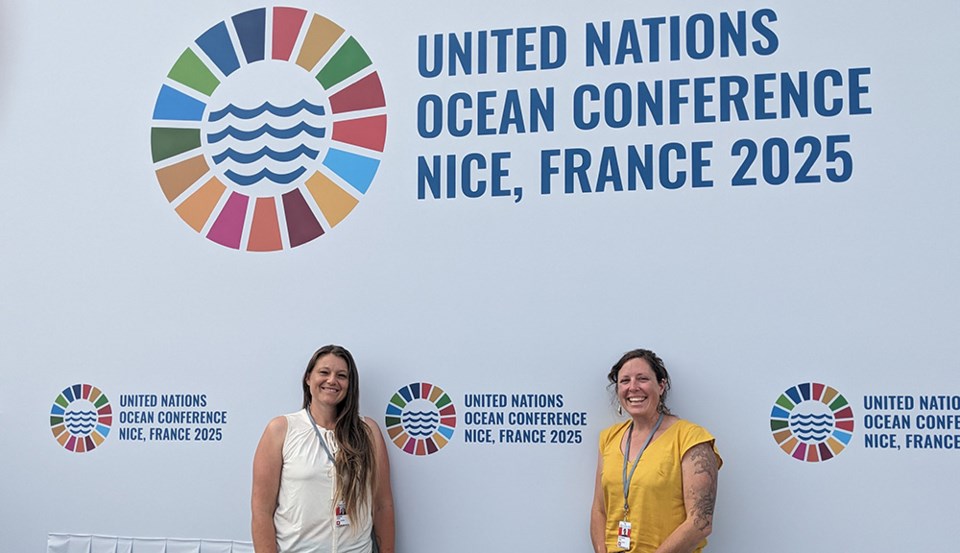Let’s Talk Trash team member Abby McLennan was able to hear about leading oceanic issues from some of the world’s top experts at the United Nations Ocean Conference in Nice, France.
McLennan said she and Chloé Dubois, from Ocean Legacy, attended the conference, which took place from June 9 to 13, as part of the Canadian delegation.
“We were enthusiastic to participate at this high-level event, advocating and providing a voice for coastal BC and the communities we work in,” said McLennan. “Let's Talk Trash and Ocean Legacy have signed on to endorse a civil society statement that echoes and builds upon the Nice Wake Up Call declaration while participating at the conference. The declaration and statement urge countries to go further, this August, at the UN negotiations to finalize an ambitious global plastics treaty that is an imperative component to effectively address marine plastic pollution.”
McLennan said she and Dubois engaged in many events, presentations and conversations, elevating the voice of coastal BC, gleaning new information for future action, and gaining inspiration from around the world to integrate into their work in qathet and the Salish Sea.
“We look forward to the conference outcome – the Nice Ocean Action Plan – comprised of a political declaration signed by member states, coupled with voluntary commitments that we hope to see turn into mandated commitments and strengthen further through an internationally binding global plastics treaty,” she added.
McLennan said attending the conference was convenient because she is currently residing in France.
“Through Ocean Legacy, we’re an accredited UN organization, so we’ve been receiving information about different UN environmental program initiatives and meetings,” she said. “For this ocean conference, we were invited onto the Canadian delegation team, instead of going as an accredited nongovernmental organization.”
McLennan said the conference lasted five days, which included great events and presentations.
“The agenda and schedule were pretty huge,” said McLennan. “We got to pick and choose through the days and times different presentations that seemed relevant to our work.
“We saw a lot of interesting things and had the opportunity to network and connect with a whole slew of scientists and other organizations and government delegates.”
While in Nice, McLennan said she and Dubois were able to connect with senior Fisheries and Oceans Canada staff.
“We are in this multi-year process of trying to get expanded polystyrene prohibited for use in aquatic environments in Canada,” said McLennan. “It was a great opportunity to speak one-on-one to people such as the deputy minister. There are some follow-up conversations that are going to happen. We hope to keep poking away, and hopefully, one day we’ll see that material prohibited from use in the waterways because it’s one of the most common items we see in cleanup.
“Styrofoam beads break off with any sort of abrasion, and then it’s really hard to clean up that type of microplastic. There are viable alternatives readily available to be used. So, it’s an easy switch-out in our minds.”
McLennan said huge amounts of expanded polystyrene are collected during the annual beach cleanups of Salish Sea shorelines.
“When we weigh it and have many thousands of kilograms, the volume is substantial,” said McLennan. “With our conversations with senior fisheries and oceans officials, we’ve outlined the steps and approaches we’ve done, and it’s still very problematic in our waters. We have a lot of data now through the clean coast clean waters initiative, which has been running for four years. Each successful project within that funding is required to do data collection on everything retrieved from the ocean, so we have a lot of data on all the material types.
“Our community has been very outspoken on this issue and we’ve moved it forward politically through a couple of different channels.”
McLennan said the province’s marine strategy speaks to not allowing expanded polystyrene in the future and that the province wants to work with the federal oceans department to address replacing existing foam infrastructure.
“It continues to be, be the squeaky wheel and not let these issues be forgotten,” said McLennan.
She said also at the conference, more than 170 countries adopted an intergovernmental declaration committing to urgent action to conserve and sustainably use the ocean. She said the political declaration titled Our Ocean, Our Future calls for concrete steps to expand marine protected areas, to decarbonize maritime transport, to combat marine pollution and mobilize finances for vulnerable coastal and island nations.
Additionally, 37 countries, led by Canada and Panama, announced the launch of the high ambition coalition for a quiet ocean, which, according to McLennan, is the first high-level political initiative to tackle ocean pollution on a global scale.
There was also a plastics treaty to address plastics in the world’s oceans. McLennan said this relates to a coming global plastics treaty negotiation taking place in August that will hopefully conclude with a legally binding instrument to address plastic in a much broader capacity, and will have significant effects on marine plastic pollution.
Last year, Meta censored Canadian news from its feeds, so we built our own social platform: syrupsocial.com – a newsfeed powered by Canadian journalists. Join the Peak on Syrup for the latest news from the Sunshine Coast and beyond, and add the Peak's email list for the top headlines right in your inbox Monday to Friday.



